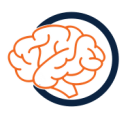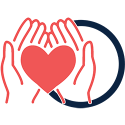We work with leaders and organizations across sectors to move beyond pre-pandemic, top-down employee recognition and self-care initiatives to create partnerships with staff that improve engagement, retention, and communication, focus on sustainable culture change, and reframe challenges as opportunities to grow and become stronger.
Our approach highlights the parallel processes of growth and learning at the individual, organizational, and collective levels. We start with building insights and skills each individual needs to stay well and to contribute to a resilient workforce, and move to collective strategies that teams, departments, and entire staffs can advance to build compassionate, healthy, and resilient organizations. Every engagement is created and viewed through an equity lens, which is specifically highlighted in sessions such as difficult conversations and brain science awareness.
Key Concepts
Social Current’s workforce resilience approach is work is based on four core learning concepts. These concepts are integrated into work at the individual, organizational and collective levels, and each concept focuses on the parallel processes of growth and learning at every level.
Advance Understanding of a Brain-Aware Perspective and How to Stay Regulated
To be well at work, especially in the complex and stressful child welfare setting, we need to know about basic brain functioning. Our brain mediates our thoughts, feelings, and behaviors, and as Dr. Bruce Perry notes “…a brain aware perspective helps me when I’m trying to understand people.” With this knowledge, we can prevent and mitigate the impact of toxic stress on our brains and bodies. We can embrace regulation, which is the basic strategy for calming our lower brain and integrate it into everyday work. Practicing brain-based interventions, such as Dr. Bruce Perry’s sequence of engagement, leads us to be able to achieve the workforce outcomes we strive for – increased trust, stronger relationships, candid conversations, more accountability.
Build Psychological Safety
Popularized by Amy Edmondson, psychological safety is the belief that the work environment is safe for interpersonal risk taking. It leads to authentic conversations critical for child welfare staff who worry about the impact of potential mistakes and can often be in a state of alarm and fear. Psychological safety promotes problem solving, innovation, connection, and growth, and supports the advancement of equity, diversity, and inclusion (EDI) initiatives. This practice is built into the workforce culture over time and requires leaders to respond to staff challenges by modeling authenticity, accountability, and compassion, and creating space for sharing and listening.
Prioritize Positive Workplace Culture
Resilience at work is highly dependent on a positive culture that reflects the organization’s stated values and beliefs. A resilient organization has a shared agreement with the employee that we work together to prevent and mitigate workforce concerns such as secondary traumatic stress and burnout. We bring to life our stated values by realizing them in our behaviors, customs, and practices. Together we build increased equity and connection for all staff, and we create realistic and healthy boundaries and expectations. And together we learn to ask for help, hold ourselves and others accountable, achieve excellence, and celebrate successes.
Increase Connection
Research from O.C. Tanner Institute notes that 45% of employees say the number of individuals they regularly interact with at work has decreased significantly over the past year, and one in three employees feel disconnected from their supervisor. We are hard wired for connection, and an organization is 12 times more likely to thrive when employees feel connected. Practices such as frequent check-ins, peer mentors, normalizing discussions around mental health and EDI, and finding shared purpose all build meaningful connections in both our virtual and hybrid settings.



